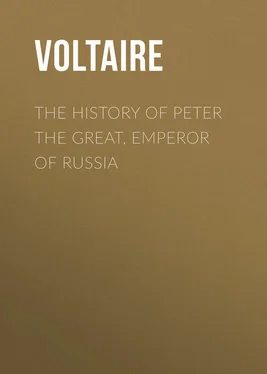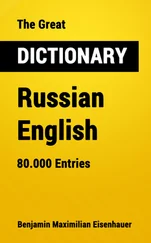Voltaire - The History of Peter the Great, Emperor of Russia
Здесь есть возможность читать онлайн «Voltaire - The History of Peter the Great, Emperor of Russia» — ознакомительный отрывок электронной книги совершенно бесплатно, а после прочтения отрывка купить полную версию. В некоторых случаях можно слушать аудио, скачать через торрент в формате fb2 и присутствует краткое содержание. Жанр: История, literature_18, foreign_prose, на английском языке. Описание произведения, (предисловие) а так же отзывы посетителей доступны на портале библиотеки ЛибКат.
- Название:The History of Peter the Great, Emperor of Russia
- Автор:
- Жанр:
- Год:неизвестен
- ISBN:нет данных
- Рейтинг книги:3 / 5. Голосов: 1
-
Избранное:Добавить в избранное
- Отзывы:
-
Ваша оценка:
- 60
- 1
- 2
- 3
- 4
- 5
The History of Peter the Great, Emperor of Russia: краткое содержание, описание и аннотация
Предлагаем к чтению аннотацию, описание, краткое содержание или предисловие (зависит от того, что написал сам автор книги «The History of Peter the Great, Emperor of Russia»). Если вы не нашли необходимую информацию о книге — напишите в комментариях, мы постараемся отыскать её.
The History of Peter the Great, Emperor of Russia — читать онлайн ознакомительный отрывок
Ниже представлен текст книги, разбитый по страницам. Система сохранения места последней прочитанной страницы, позволяет с удобством читать онлайн бесплатно книгу «The History of Peter the Great, Emperor of Russia», без необходимости каждый раз заново искать на чём Вы остановились. Поставьте закладку, и сможете в любой момент перейти на страницу, на которой закончили чтение.
Интервал:
Закладка:
Below the country of the Samojedes lies that of the Ostiaks, along the river Oby. These people have no resemblance in any respect with the Samojedes, save that like them and all the first race of men, they are hunters, fishermen, and shepherds; some of them have no religion, not being formed into any society, and the others who live together in herds or clans, have a kind of worship, and pray to the principal object of their wants; they adore the skin of a sheep, because this creature is of all others the most serviceable to them; just as the Egyptian husbandmen made choice of an ox, as an emblem of the Deity who created that creature for the use of man.
The Ostiaks have likewise other idols, whose origin and worship are as little deserving our notice as their worshippers. There were some converts to Christianity made amongst them in the year 1712; but these, like the lowest of our peasants, are Christians without knowing what they profess. Several writers pretend that these people were natives of Great Permia, but as Great Permia is in a manner a desert, how comes it that its inhabitants should settle themselves at such a distance, and so inconveniently? This is a difficulty not worth clearing up. Every nation which has not cultivated the polite arts, deserves to remain in obscurity.
In the country of the Ostiaks in particular, and amongst their neighbours the Burates and Jakutians, they often discover a kind of ivory under ground, the nature of which is as yet unknown. Some take it to be a sort of fossil, and others the tooth of a species of elephants, the breed of which have been destroyed: but where is the country that does not afford some natural productions, which at once astonish and confound philosophy.
Several mountains in this country abound with the amianthes or asbestos, a kind of incombustible flax, of which a sort of cloth and paper is sometimes made.
To the south of the Ostiaks are the Burates, another people, who have not yet been made Christians. Eastward there are several hordes, whom the Russians have not as yet entirely subdued.
None of these people have the least knowledge of the calendar: they reckon their time by snows, and not by the apparent motion of the sun: as it snows regularly, and for a long time every winter, they say, 'I am so many snows old,' just as we say, I am so many years.
And here I must relate the accounts given by the Swedish officer Strahlemberg, who was taken prisoner in the battle of Pultowa, and lived fifteen years in Siberia, and made the entire tour of that country. He says, that there are still some remains of an ancient people, whose skin is spotted or variegated with different colours, and that he himself had seen some of them, and the fact has been confirmed to me by Russians born at Tobolsky. The variety of the human species seems to be greatly diminished, as we find very few of these extraordinary people, and they have probably been exterminated by some other race: for instance there are very few Albinos, or White Moors; one of them was presented to the academy of sciences at Paris, which I saw. It is the same with respect to several other species of animals which are rare.
As to the Borandians, of whom mention is made so frequently in the learned history of the king's garden, my memoirs say, that this race of people is entirely unknown to the Russians.
All the southern part of these countries is peopled by numerous hordes of Tartars. The ancient Turks came from this part of Tartary to conquer these extensive countries, of which they are at present in possession. The Calmucs and Monguls are the very Scythians who, under Madies, made themselves masters of Upper Asia, and conquered Cyaxares, king of the Medes. They are the men, whom Gengis Khan and his sons led afterwards as far as Germany, and was termed the Mogul empire under Tamerlane. These people afford a lively instance of the vicissitudes which have happened to all nations; some of their hordes, so far from being formidable now, are become vassals to Russia.
Among these is a nation of Calmucs, dwelling between Siberia and the Caspian Sea, where, in the year 1720, there was discovered a subterraneous house of stone, with urns, lamps, earrings, an equestrian statue of an oriental prince, with a diadem on his head, two women seated on thrones, and a roll of manuscripts, which were sent by Peter the Great to the academy of inscriptions at Paris, and proved to be written in the Thibet language: all these are striking proofs, that the liberal arts formerly resided in this now barbarous country, and are lasting evidences of the truth of what Peter the Great was wont several times to say, viz. that the arts had made the tour of the globe.
The last province is Kamtshatka, the most eastern part of the continent. The inhabitants were absolutely void of all religion when they were first discovered. The north part of this country likewise affords fine furs, with which the inhabitants clothed themselves in winter, though they went naked all the summer season. The first discoverers were surprised to find in the southern parts men with long beards, while in the northern parts, from the country of the Samojedes, as far as the mouth of the river Amur, they have no more beards than the Americans. Thus, in the empire of Russia, there is a greater number of different species, more singularities, and a greater diversity of manners and customs, than in any country in the known world.
The first discovery of this country was made by a Cossack officer, who went by land from Siberia to Kamtshatka, in 1701, by order of Peter the Great, who, notwithstanding his misfortune at Narva, still continued to extend his care from one extremity of the continent to the other. Afterwards, in 1725, some time before death surprised him, in the midst of his great exploits, he sent Captain Bering, a Dane, with express orders to find out, if possible, a passage by the sea of Kamtshatka, to the coast of America. Bering did not succeed in his first attempt; but the empress Anne sent him out again in 1733. M. Spengenberg, captain of a ship, his associate in this voyage, set out the first from Kamtshatka, but could not put to sea till the year 1739, so much time was taken up in getting to the port where they were to embark, in building and fitting out the ships, and providing the necessaries. Spengenberg sailed as far as the north part of Japan, through a streight, formed by a long chain of islands, and returned without having discovered the passage.
In 1741, Bering cruised all over this sea, in company with De Lisle de la Croyere, the astronomer, of the same family of L'Isle, which has produced such excellent geographers: another captain likewise went upon the same discovery. They both made the coast of America, to the northward of California. Thus the north-east passage, so long sought after, was at length discovered, but there were no refreshments to be met with in those barren coasts. Their fresh water failed them, and part of the crew perished with the scurvy. They saw the northern bank of California for above a hundred miles, and saw some leathern canoes, with just such a sort of people in them as the Canadians. All their endeavours however proved fruitless: Bering ended his life in an island, to which he gave his name. The other captain, happening to be closer in with the Californian coast, sent ten of his people on shore, who never returned. The captain, after waiting for them in vain, found himself obliged to return back to Kamtshatka, and De Lisle died as he was going on shore. Such are the disasters that have generally attended every new attempt upon the northern seas. But what advantages may yet arise from these powerful and dangerous discoveries, time alone can prove.
We have now described all the different provinces that compose the Russian dominions, from Finland to the sea of Japan. The largest parts of this empire have been all united at different times, as has been the case in all other kingdoms in the world. The Scythians, Huns, Massagetes, Slavians, Cimbrians, Getes, and Sarmatians, are now subjects of the czar. The Russians, properly so called, are the ancient Roxolani or Slavi.
Читать дальшеИнтервал:
Закладка:
Похожие книги на «The History of Peter the Great, Emperor of Russia»
Представляем Вашему вниманию похожие книги на «The History of Peter the Great, Emperor of Russia» списком для выбора. Мы отобрали схожую по названию и смыслу литературу в надежде предоставить читателям больше вариантов отыскать новые, интересные, ещё непрочитанные произведения.
Обсуждение, отзывы о книге «The History of Peter the Great, Emperor of Russia» и просто собственные мнения читателей. Оставьте ваши комментарии, напишите, что Вы думаете о произведении, его смысле или главных героях. Укажите что конкретно понравилось, а что нет, и почему Вы так считаете.












